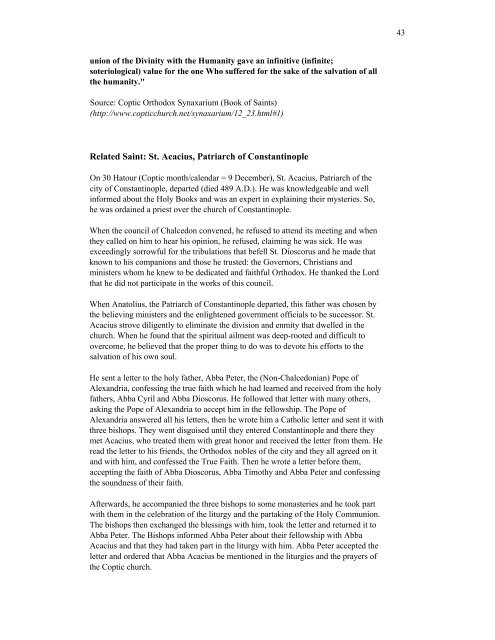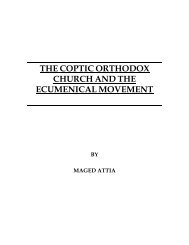Coptic interpretations of the Fourth Ecumenical Council - Saint Mina ...
Coptic interpretations of the Fourth Ecumenical Council - Saint Mina ...
Coptic interpretations of the Fourth Ecumenical Council - Saint Mina ...
Create successful ePaper yourself
Turn your PDF publications into a flip-book with our unique Google optimized e-Paper software.
union <strong>of</strong> <strong>the</strong> Divinity with <strong>the</strong> Humanity gave an infinitive (infinite;<br />
soteriological) value for <strong>the</strong> one Who suffered for <strong>the</strong> sake <strong>of</strong> <strong>the</strong> salvation <strong>of</strong> all<br />
<strong>the</strong> humanity."<br />
Source: <strong>Coptic</strong> Orthodox Synaxarium (Book <strong>of</strong> <strong>Saint</strong>s)<br />
(http://www.copticchurch.net/synaxarium/12_23.html#1)<br />
Related <strong>Saint</strong>: St. Acacius, Patriarch <strong>of</strong> Constantinople<br />
On 30 Hatour (<strong>Coptic</strong> month/calendar = 9 December), St. Acacius, Patriarch <strong>of</strong> <strong>the</strong><br />
city <strong>of</strong> Constantinople, departed (died 489 A.D.). He was knowledgeable and well<br />
informed about <strong>the</strong> Holy Books and was an expert in explaining <strong>the</strong>ir mysteries. So,<br />
he was ordained a priest over <strong>the</strong> church <strong>of</strong> Constantinople.<br />
When <strong>the</strong> council <strong>of</strong> Chalcedon convened, he refused to attend its meeting and when<br />
<strong>the</strong>y called on him to hear his opinion, he refused, claiming he was sick. He was<br />
exceedingly sorrowful for <strong>the</strong> tribulations that befell St. Dioscorus and he made that<br />
known to his companions and those he trusted: <strong>the</strong> Governors, Christians and<br />
ministers whom he knew to be dedicated and faithful Orthodox. He thanked <strong>the</strong> Lord<br />
that he did not participate in <strong>the</strong> works <strong>of</strong> this council.<br />
When Anatolius, <strong>the</strong> Patriarch <strong>of</strong> Constantinople departed, this fa<strong>the</strong>r was chosen by<br />
<strong>the</strong> believing ministers and <strong>the</strong> enlightened government <strong>of</strong>ficials to be successor. St.<br />
Acacius strove diligently to eliminate <strong>the</strong> division and enmity that dwelled in <strong>the</strong><br />
church. When he found that <strong>the</strong> spiritual ailment was deep-rooted and difficult to<br />
overcome, he believed that <strong>the</strong> proper thing to do was to devote his efforts to <strong>the</strong><br />
salvation <strong>of</strong> his own soul.<br />
He sent a letter to <strong>the</strong> holy fa<strong>the</strong>r, Abba Peter, <strong>the</strong> (Non-Chalcedonian) Pope <strong>of</strong><br />
Alexandria, confessing <strong>the</strong> true faith which he had learned and received from <strong>the</strong> holy<br />
fa<strong>the</strong>rs, Abba Cyril and Abba Dioscorus. He followed that letter with many o<strong>the</strong>rs,<br />
asking <strong>the</strong> Pope <strong>of</strong> Alexandria to accept him in <strong>the</strong> fellowship. The Pope <strong>of</strong><br />
Alexandria answered all his letters, <strong>the</strong>n he wrote him a Catholic letter and sent it with<br />
three bishops. They went disguised until <strong>the</strong>y entered Constantinople and <strong>the</strong>re <strong>the</strong>y<br />
met Acacius, who treated <strong>the</strong>m with great honor and received <strong>the</strong> letter from <strong>the</strong>m. He<br />
read <strong>the</strong> letter to his friends, <strong>the</strong> Orthodox nobles <strong>of</strong> <strong>the</strong> city and <strong>the</strong>y all agreed on it<br />
and with him, and confessed <strong>the</strong> True Faith. Then he wrote a letter before <strong>the</strong>m,<br />
accepting <strong>the</strong> faith <strong>of</strong> Abba Dioscorus, Abba Timothy and Abba Peter and confessing<br />
<strong>the</strong> soundness <strong>of</strong> <strong>the</strong>ir faith.<br />
Afterwards, he accompanied <strong>the</strong> three bishops to some monasteries and he took part<br />
with <strong>the</strong>m in <strong>the</strong> celebration <strong>of</strong> <strong>the</strong> liturgy and <strong>the</strong> partaking <strong>of</strong> <strong>the</strong> Holy Communion.<br />
The bishops <strong>the</strong>n exchanged <strong>the</strong> blessings with him, took <strong>the</strong> letter and returned it to<br />
Abba Peter. The Bishops informed Abba Peter about <strong>the</strong>ir fellowship with Abba<br />
Acacius and that <strong>the</strong>y had taken part in <strong>the</strong> liturgy with him. Abba Peter accepted <strong>the</strong><br />
letter and ordered that Abba Acacius be mentioned in <strong>the</strong> liturgies and <strong>the</strong> prayers <strong>of</strong><br />
<strong>the</strong> <strong>Coptic</strong> church.<br />
43








